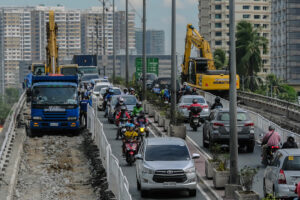Should public works projects run 24/7? Should work be round-the-clock particularly for public infrastructure projects? A few of our congressmen believe this should be the rule for government-funded projects. The objective, of course, is to complete projects in the least possible time. And, to minimize the disruptions they cause to the public.
I am certain the lawmakers’ call for 24/7 work resonates with many voters, especially those inconvenienced by the slow progress on roads and bridges, among others. Add to the list the unending diggings around the country due to telecommunication or water works. Resulting traffic jams have led to significant losses for people and businesses.
It is thus unsurprising that a few lawmakers are now pushing for House Bill No. 9666, which aims to compel government construction projects to work 24/7 until they are completed. The bill’s aim is to minimize disruptions, particularly traffic jams that affect private and public commuters, and business losses resulting from them.
But how feasible is continuous work for 24-hours, seven days in a week, for public works projects? More important, what will be the cost implications to the government? Three shifts daily, including night differential, and possibly overtime for some workers, can add to the project bill. Cost of equipment use and maintenance can also go up, as risk of break down increases.
In short, with 24/7 work, something is bound to give. In some cases, rushed work leads to mistakes and shortcuts. It can also result in more accidents. Pushing people and equipment to their limits can also be counterproductive. And, factoring in corruption, 24/7 work can result in higher project cost, and possibly a bigger percentage of public money lost to corruption.
And then, we have the cost of “incentives.” As the bill states, “to motivate compliance and ensure the efficiency of round-the-clock operations, contractors and workers engaged in government infrastructure projects under this Act may be eligible for incentives. The criteria and guidelines for the grant of incentives shall be established by the implementing agency.”
But the bill also warns that “failure to adhere to the provisions of this Act shall result in penalties for the implementing agency, including possible budgetary reductions for future projects. Contractors found to be negligent in implementing round-the-clock operations may face sanctions, including suspension from participating in government projects.”
Over all, the 24/7 requirement can work. But it will have to be case-to-case and not across the board. Not all instances will allow round-the-clock work, especially in residential areas or those near residential areas. But on roads like EDSA, that operate 24/7 anyway, public works projects can operate round the clock.
More important, before requiring 24/7 operations on public works projects, Congress must first ensure that such operations truly comply with labor laws, health and safety regulations, and environmental standards. Otherwise, a 24/7 operation will just exacerbate or aggravate whatever breach already exists.
Critical and time-sensitive projects or emergency projects should require 24/7 work, but this should not be at the expense of labor, health, and environmental standards. And, 24/7 work should not result in disruption or inconvenience to the public that will be far greater than what would have occurred had the project run on regular hours only.
But regular road repairs and maintenance, even bridge construction, in far-flung areas or in places where vehicular and pedestrian traffic is minimal, then regular work hours will do. But, even 24/7 work can adhere to peak and off-peak work hours, to minimize public disruption. Effective and efficient project planning and management, however, will be critical to this.
In other countries, night work and extended hours are common for public works projects to reduce traffic disruption and expedite completion times. However, these projects are also made to adhere to stringent noise and safety regulations, particularly when undertaken in densely populated areas. They must also comply with local ordinances and labor laws.
The proposed law on 24/7 work on government projects should strike a balance between project completion time, minimizing disruption, and adhering to safety standards and worker protection regulations and other labor laws. Efficiency and expediency are of utmost importance, but these should not be at the expense of worker safety, public health, and environmental considerations.
But more important considerations are project criticality and impact on project cost. A public works project that requires three eight-hour work shifts rather than just one can cost significantly more in terms of labor, require more workhours, but not necessarily take just a third of the time to finish. There are many other factors to consider, including cement curing time, weather, and equipment and supply availability, among others.
Take the case of the Philippine National Railways’ ongoing rehabilitation. The government deemed it more practical to completely shut down part of the line for several years, rather than doing the work while keeping the line working. Feasibility studies indicated to them the practicality of shutting down indefinitely, since the continued service is not as critical to the public as expedient rehabilitation.
The same parameters apply to other government projects, including road and bridge construction. In this line, the proposed bill should set the parameters as to when 24/7 should be applied. The bill, when passed into law, should allow agencies some discretion and the flexibility in meeting the mandate as needed.
The bill should also provide for improving government capacity in project planning and management. Otherwise, it will be less effective in pursuing its objectives. Cost overruns may become the rule rather than the exceptions, without significantly improving government efficiency and reducing corruption.
Marvin Tort is a former managing editor of BusinessWorld, and a former chairman of the Philippine Press Council





